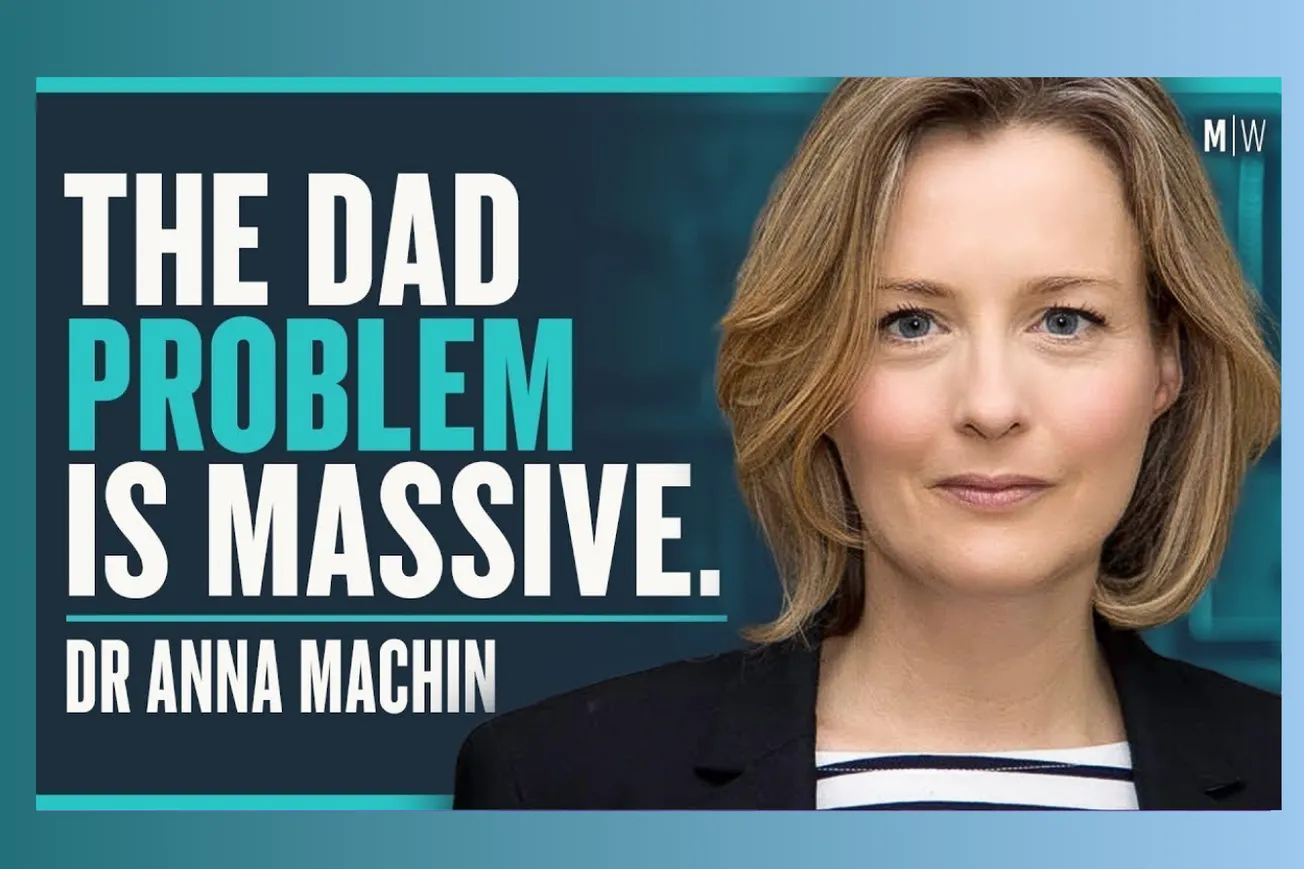Table of Contents
Dr. Anna Machin reveals how fathers became evolutionarily essential for human survival and why modern culture's dismissal of paternal importance contradicts biological reality and harms children's development.
Key Takeaways
- Fathers evolved as essential co-parents because human babies became too helpless for mothers to raise alone
- Only 5% of mammal species have investing fathers - humans are evolutionary outliers requiring paternal involvement
- Men are as biologically primed for parenting as women, with measurable brain changes during fatherhood
- Testosterone drops by up to one-third when men become fathers and never returns to pre-birth levels
- Fathers specialize in scaffolding children's entry into the world beyond family through challenge and social preparation
- Father-child relationships predict adolescent mental health more strongly than mother-child relationships, especially for girls
- Rough-and-tumble play serves crucial developmental functions for building resilience, empathy, and risk assessment
- Cultural narratives portraying fathers as incompetent or surplus undermine male confidence and child outcomes
- 10% of new fathers experience postnatal depression, largely unrecognized by healthcare systems
Timeline Overview
- 00:00-15:00 — Debunking father myths, evolutionary necessity of male parental investment, brain size vs. birth canal problems
- 15:00-30:00 — 750,000 years ago vs. modern fatherhood, testosterone changes, bonding hormone mechanics, skin-to-skin contact importance
- 30:00-45:00 — Brain changes in fathers, risk detection increases, empathy development, executive function improvements
- 45:00-60:00 — Different roles of mothers vs. fathers, social scaffolding function, challenge provision, rough-and-tumble play benefits
- 60:00-75:00 — Adolescent mental health impacts, father-daughter relationships, cultural variations in fathering, special needs considerations
- 75:00-90:00 — Cultural narratives undermining fathers, media representations, feminist pushback, empathy gap for struggling fathers
- 90:00-105:00 — Postnatal depression in fathers, competing pressures, structural support needs, antenatal group recommendations
- 105:00-120:00 — Policy recommendations, paternity leave importance, research directions, special needs fathering
The Evolutionary Crisis That Made Fathers Essential
Dr. Anna Machin's most striking revelation concerns how fathers literally saved humanity from extinction. About 1.8 million years ago, human evolution hit a demographic crisis: "Our brains are six times bigger than they should be for an animal of our size" while bipedalism narrowed birth canals. "We got to this point where the head would no longer fit through the pelvis at full term."
The solution involved birthing increasingly premature babies, but this created unprecedented childcare demands. "We should be pregnant for much much longer than we are... that meant you have this helpless baby and Mum wasn't able to do that entirely on her own." Initially, extended female kin networks provided support, but brain size continued expanding.
"About half a million years ago our brains took a massive leap again and suddenly just relying on your sisters your grandmother your mom whoever it might be wasn't enough... the species was threatened with extinction because these babies were not surviving."
Evolution responded by recruiting fathers - an extraordinary development since "only five percent of mammals actually have investing fathers so we're really rare and we're actually the only ape that does it." This wasn't optional adaptation but survival necessity: "If Dad hadn't stuck around the species I would argue would have died out."
- Human babies require approximately 18 months of gestation to achieve chimp-level mobility, but birth canal constraints force birth at 9 months
- The demographic crisis emerged when brain development outpaced female kin networks' capacity to provide sufficient childcare
- Male parental investment represents such an unusual mammalian strategy that it only evolved under extreme survival pressure
- Evolution "hates redundancy" and wouldn't create identical parenting roles unless absolutely necessary for species survival
- The transition from promiscuous mating to parental monogamy occurred because spreading seed meant zero surviving offspring
- Modern fathers carry evolutionary programming designed specifically for human survival under unique developmental constraints
This evolutionary history explains why dismissing fathers as "surplus to requirements" contradicts fundamental biological reality.
The Biological Reality of Father-Child Bonding
Machin demolishes the myth that "fathers men are not instinctive parents" by documenting measurable biological changes during fatherhood. "We've discovered that men are as biologically primed to parent as women are" through hormonal shifts that fundamentally alter male psychology and neurology.
The testosterone transformation proves particularly dramatic: "When you do become a father for the first time it drops significantly like really significantly up to a third and it will never return to the pre-birth level as long as you remain in contact with your child." This isn't temporary adjustment but permanent biological recalibration.
Brain scans reveal identical changes in mothers and fathers: "We see changes in the very core of the brain... particularly in the limbic care of the brain the amygdala and the hypothalamus which are related to risk detection... we see the areas related to empathy increase in size... all those really good parenting skills like attention and planning and problem solving."
However, father bonding follows different timelines than maternal bonding. While mothers receive "a massive flood of hormones which help her give birth... as a side effect our amazing bonding hormones," fathers "can only build their bond because they don't go through that physiological process... they have to build their bond through interaction."
- Testosterone reduction makes fathers more emotionally responsive and less focused on mate-seeking behaviors
- High testosterone blocks bonding hormone effects, so the drop enables oxytocin and dopamine responsiveness
- Brain imaging shows fathers develop enhanced empathy, risk detection, and executive function capabilities
- Father bonding requires active interaction rather than automatic hormonal activation, making early engagement crucial
- Ten percent of new fathers experience postnatal depression, often triggered by feeling excluded from early bonding opportunities
- Skin-to-skin contact triggers behavioral synchrony where baby's physiology matches father's heart rate, temperature, and blood pressure
Understanding these biological realities helps fathers recognize that delayed bonding represents normal developmental processes rather than personal inadequacy.
Fathers as Social Scaffolding Specialists
Machin's research reveals that evolution created distinct parenting specializations rather than redundant roles. While mothers excel at early nurturing constrained by "childbirth... breastfeeding particularly in the early stages," fathers specialize in "scaffolding the child's entry into the world beyond the family."
This specialization appears in brain activation patterns: "The big activation in the maternal brain are in the core of the brain... very very ancient... that's where nurturing is and attachment is and risk detection is" while fathers show "peak in activation... in the neocortex the newest bit of the brain... in the social cognition areas."
Father specialization manifests across cultures despite different surface behaviors. In Kenya, "Dad will take the child into fields to teach them how to use the crop but the most important thing he does is he takes them to the market and he teaches them how to build the social network." Western fathers similarly "get the really good work experience gig because he's built a really good Network."
The challenge provision role proves particularly crucial: "We live in a really difficult world... you need to be given those challenges in a way as a child which is challenging but not too much... it seems to me that Dad is the key one in doing that."
- Fathers focus on preparing children for independence while mothers provide security and comfort during dependency
- Social cognition areas in father brains activate more strongly, indicating evolutionary specialization for external world navigation
- Cross-cultural studies show fathers universally engage in social network building and skill transfer regardless of specific cultural practices
- Challenge provision starts with rough-and-tumble play around 6-9 months and continues through adolescence
- Father attachment quality predicts preschool social adjustment better than mother attachment in areas like sharing, caring, and helping
- The specialization explains why single-parent homes often struggle despite heroic maternal efforts - key developmental inputs are missing
This division of labor optimizes child development outcomes by providing complementary rather than competitive parenting inputs.
Rough-and-Tumble Play: The Father's Secret Weapon
Machin identifies rough-and-tumble play as fathers' most distinctive and powerful bonding tool. "When dad say to me what's the one thing I can do with my child to build our bonds to help my child I'll say play with them. It is the most critical thing."
This play style serves multiple developmental functions beyond entertainment: "The child starts to learn about reciprocity and social relationships... understanding... am I actually pushing the other person too much that they're not enjoying this anymore so empathy is involved... physical challenge... about risk how can I assess risk."
The bonding mechanism proves particularly efficient for time-pressed Western fathers: "Because it's so fast and so in a way time efficient it does it in this souped-up way... if you Rough and Tumble play with them it's much much more of an impact much higher levels of those chemicals so it's actually a really good way of building a tight Bond pretty quickly."
Importantly, rough-and-tumble play represents cultural adaptation to modern constraints rather than universal requirement. The Aka people of Congo "spend at least about 55 to 60% of their day in actual physical contact with their children... they don't really do it but they are with their children all day."
- Rough-and-tumble play releases high levels of oxytocin and beta-endorphin through combination of exercise, touch, and mild controlled stress
- The play style teaches reciprocity, empathy, physical challenge navigation, and risk assessment simultaneously
- Western fathers developed this intensive bonding strategy because work demands limit total interaction time with children
- The "souped-up" efficiency allows significant bonding in brief time windows compared to lower-intensity extended contact
- Both approaches produce similar attachment outcomes, suggesting multiple pathways to secure father-child relationships
- The key factor is consistent, engaged interaction rather than specific play styles or time quantities
This research validates fathers who worry about limited time availability while emphasizing the importance of quality engagement during available windows.
Adolescent Mental Health: The Father Advantage
Machin's most surprising finding concerns fathers' impact on adolescent mental health: "The biggest factor in a child's mental health when we look at the parental input is actually the relationship they have with their dad... like the superhero of mental resilience for boys and girls for boys and actually for girls it's even more powerful."
This effect proves particularly strong for daughters in patriarchal contexts: "In a patriarchal world if you have a dad who spends time with you who inputs into your life who values your opinions... it's saying you know you are valuable what you say is valuable and I'm going to support you in saying it."
The mechanism involves validation during crucial identity formation: "It's okay for you to voice Who You Are and I am here and I'm going to support you in that... so actually it can be a bigger impact on girls than on boys."
Crucially, fathers don't need elaborate interventions: "Dad doesn't really have to do anything amazing... what seems to work with adolescents is just feeling that you as a father value their company and you as a father as a busy person have taken the time to spend time with them."
- Adolescent mental health benefits from father relationships extend well into young adulthood with reduced depression, anxiety, and loneliness
- Father validation provides unique psychological benefits because paternal attention is perceived as particularly scarce and valuable
- Simple activities like "washing the car walking the dog making Sunday lunch" prove sufficient when fathers demonstrate genuine engagement
- Secure father attachments improve stress resilience and daily life coping mechanisms beyond the family environment
- The timing proves crucial because adolescence involves shifting primary attachment from parents to peers, making social scaffolding essential
- Father relationships buffer against social anxiety and body image issues that commonly emerge during peer-focused developmental phases
These findings suggest that father involvement during adolescence may be even more critical than early childhood engagement for long-term outcomes.
Cultural Narratives Undermining Fathers
Machin identifies systematic cultural messaging that undermines father confidence and family functioning. "We still... have less representations of the completely useless dad... but it's still there it's a very ingrained... belief Homer Simpson Peter Griffin... if you've ever watched Peppa Pig... Daddy Pig is just the worst representation of fatherhood you've ever seen."
These representations create real psychological barriers: "A lot of them lack a lot of confidence and they do very much belittle themselves in relation for example to what mom is doing" because fathers "tend to see what mum does as a gold standard of parenting and whatever they do as a secondary bit of a failure."
The feminist movement contains internal contradictions regarding father involvement: "There is an element of feminism that doesn't want men to be involved and they want the Primacy of the woman to be kept as a parent... I have had backlashes from fellow women because of the work I do because I should be studying mothers as a woman."
Healthcare systems perpetuate father marginalization through systematic exclusion: "When the health visit comes around after birth... she'll spend the whole time going how are you Mum and we'll never ever at any point say how are you dad... because he's just the guy in the corner... making the tea."
- Media representations consistently portray fathers as incompetent, creating self-fulfilling prophecies about male parenting capabilities
- Healthcare systems treat fathers as support staff for mothers rather than co-parents undergoing their own developmental transitions
- Some feminist ideology prioritizes maternal primacy over child welfare outcomes that benefit from dual-parent involvement
- Government reluctance to invest in father support stems from short-term cost concerns despite long-term societal benefits
- The "empathy gap" means male struggles receive less sympathy and support compared to equivalent female challenges
- Cultural messaging creates internal conflict where fathers simultaneously face pressure to be "hands-on" while being told they're secondary parents
These narratives create unnecessary barriers to optimal child development outcomes by undermining natural father-child bonding processes.
The Competing Pressures Facing Modern Fathers
Machin documents the impossible expectations placed on contemporary fathers through a case study of severe paternal postnatal depression. The father faced: "Traumatic birth... left standing in a room on his own for six hours with the newborn baby... nobody told him anything... thinks his wife's dying... only gets two weeks paternity leave... has to go back to work leave her on his own... takes a promotion... to a new job."
These competing demands create psychological pressure cookers: "Men are told now you have to be the Hands-On father and you have to be the perfect father... but you're also still told no but you still have to be the breadwinner and you have to be the Rock and you're not allowed to have any emotions."
The timeline intensifies the pressure: "She's in hospital for 10 days so he's actually home with the baby and the wife who's still very ill for three days then he has to go back to work... stays up all night with the baby then goes back to work... trying to impress the new job."
Modern fathers face historical role confusion without adequate support systems: "We have celebrity fathers with their purposess and it's all amazing... but that is a massive pressure cooker of stress... if you... might have had a history of depression before... if your partner is depressed you are much more likely yourself to get postnatal depression."
- Modern fathers must simultaneously excel as emotional caregivers, financial providers, and stoic supporters without acknowledgment of inherent role conflicts
- Limited paternity leave forces fathers to choose between bonding opportunities and economic security for their families
- Healthcare systems focus exclusively on maternal support while ignoring paternal mental health needs during vulnerable transition periods
- Social media and celebrity culture create unrealistic expectations about effortless father-child bonding without acknowledging normal developmental timelines
- Partner mental health significantly impacts father wellbeing, yet support systems rarely address this secondary impact
- The cultural shift toward expecting "hands-on" fatherhood occurred without dismantling traditional breadwinner expectations or providing structural support
These competing pressures explain rising rates of paternal mental health issues and suggest need for systematic cultural and policy changes.
Evidence-Based Solutions for Supporting Fathers
Machin advocates for specific interventions based on scientific understanding of father development. "I wish fundamentally that everybody knew this about men I wish they knew the science... how important fathers were... how many different things there are to balance and how difficult it is."
Healthcare system changes could dramatically improve outcomes: "When parents did antenatal training that there was more time spent just with men helping them... they need as much support as mom does but just in a different way... they are fundamentally going through... as much of an emotional physiological changes moments it's just hidden."
Father-specific support groups prove particularly powerful: "If you do a man's group and particularly if you bring in men... where there's a dad there who goes it's okay they open up amazingly... having some experienced dads there is really powerful because they will turn around and go that happened to me but I can assure you it's all fine."
Policy interventions could address structural barriers: "Equal paternity leave for fathers... women can go back to work sooner they have less of a career penalty... the gender pay Gap reduces... it's kind of a bit of a no-brainer but convincing governments is another issue."
- Healthcare providers should routinely assess father mental health and provide father-specific resources during prenatal and postnatal care
- Antenatal education should include father-only sessions addressing male-specific bonding timelines and challenges
- Workplace policies should recognize father involvement as essential for child development rather than optional accommodation
- Media representation should shift toward competent fathers to counter decades of incompetence stereotypes
- Father support groups should become standard offerings in communities, modeled on successful maternal support networks
- Research funding should prioritize father-child relationships equally with mother-child relationships to build evidence base for interventions
Implementing these changes could significantly improve child development outcomes while supporting father mental health and family functioning.
Conclusion
Dr. Anna Machin's research reveals that fathers evolved as essential co-parents whose involvement remains biologically necessary for optimal child development. The cultural narrative dismissing fathers as "surplus to requirements" contradicts evolutionary biology and measurable brain science showing fathers undergo profound changes that prime them for specialized parenting roles. While mothers excel at early nurturing and security provision, fathers specialize in scaffolding children's entry into the social world through challenge, play, and resilience building.
The father-child relationship proves particularly crucial for adolescent mental health and long-term life outcomes. However, modern fathers face impossible competing pressures between traditional breadwinner expectations and contemporary hands-on parenting demands, often without adequate support systems. Understanding the science of fatherhood can guide evidence-based interventions that support father development while optimizing child outcomes.
Practical Implications
- Recognize that father bonding develops through interaction rather than immediate hormonal attachment, requiring patience and consistent engagement
- Prioritize skin-to-skin contact between fathers and newborns to trigger bonding hormones and behavioral synchrony
- Understand that rough-and-tumble play serves crucial developmental functions beyond entertainment, building empathy, resilience, and social skills
- Advocate for father-specific antenatal education and support groups that address male parenting timelines and challenges
- Support policy changes for equal paternity leave that benefit children, mothers, and fathers while reducing gender pay gaps
- Challenge cultural narratives that portray fathers as incompetent or secondary parents through media representation and personal conversations
- Provide father-specific mental health resources during the transition to parenthood, recognizing 10% of new fathers experience depression
- Value father time and attention during adolescence as particularly important for building resilience and self-esteem, especially in daughters
- Recognize that father absence requires replacement through social fathers (grandfathers, uncles, coaches) rather than dismissing male influence entirely
- Understand that supporting fathers benefits everyone in the family system rather than creating zero-sum competition for resources or attention





